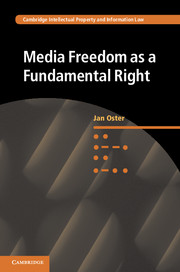Book contents
- Frontmatter
- Contents
- Preface and acknowledgements
- Table of cases
- Treaties, Conventions, Declarations and Statutes
- Reports and other documentary sources
- Introduction: aim, scope and method
- Part I The theoretical foundations of media freedom
- Part II General rules on media freedom
- 3 Beneficiaries of media freedom: who is ‘the media’?
- 4 The content of media freedom: media speech privileges and institutional protection of the media
- 5 The notion of an ‘interference’ with media freedom
- 6 Justification of an interference with media freedom
- Part III Specific limitations to media freedom
- Conclusion: tenets of a Media Freedom Principle
- Bibliography
- Index
- Cambridge Intellectual Property and Information Law
6 - Justification of an interference with media freedom
from Part II - General rules on media freedom
Published online by Cambridge University Press: 05 June 2015
- Frontmatter
- Contents
- Preface and acknowledgements
- Table of cases
- Treaties, Conventions, Declarations and Statutes
- Reports and other documentary sources
- Introduction: aim, scope and method
- Part I The theoretical foundations of media freedom
- Part II General rules on media freedom
- 3 Beneficiaries of media freedom: who is ‘the media’?
- 4 The content of media freedom: media speech privileges and institutional protection of the media
- 5 The notion of an ‘interference’ with media freedom
- 6 Justification of an interference with media freedom
- Part III Specific limitations to media freedom
- Conclusion: tenets of a Media Freedom Principle
- Bibliography
- Index
- Cambridge Intellectual Property and Information Law
Summary
A common principle that runs through all international human rights catalogues is that freedom of expression and media freedom are not absolute. The exercise and enjoyment of freedom of expression and/or media freedom can be restricted under the conditions mentioned in Article 19(3) ICCPR, Article 13(2) ACHR, Article 10(2) ECHR and Article 52 EUChFR.
Unfortunately, the African Charter provides a confusing system of limitations. Article 9(2) AfCHPR does not stipulate examples of limitations, but states in rather general terms that ‘[e]very individual shall have the right to express and disseminate his opinions within the law’. Article 9 (2) AfCHPR thus includes the caveat ‘within the law’. This contradicts two basic ideas of international human rights: first, legislation must operate within the framework of human rights, and not vice versa. Second, international human rights standards should prevail over national law. Consequently, State Parties must not be enabled to negate the rights conferred upon individuals by the Charter. Accordingly, the AfComHPR rightly held that national law cannot set aside the right to express and disseminate one's opinions, because this would make the protection of this right ineffective. If national law had precedence over the Charter, this would defeat the purpose of its protection. Rather, any interference with the rights enshrined in the Charter must be in conformity with the Charter. As a consequence, ‘within the law’ means that the interference itself must be lawful – especially with a view to international human rights law.
However, this leaves open the question what the requirements of a limitation are, and, in particular, what aims an interference has to pursue. For this purpose, Part I Chapter II of the African Charter provides duties every individual has to fulfil under the Charter, which bears a close resemblance to the ‘duties and responsibilities’ clauses in Article 19(3) ICCPR and Article 10(2) ECHR.
- Type
- Chapter
- Information
- Media Freedom as a Fundamental Right , pp. 110 - 144Publisher: Cambridge University PressPrint publication year: 2015



